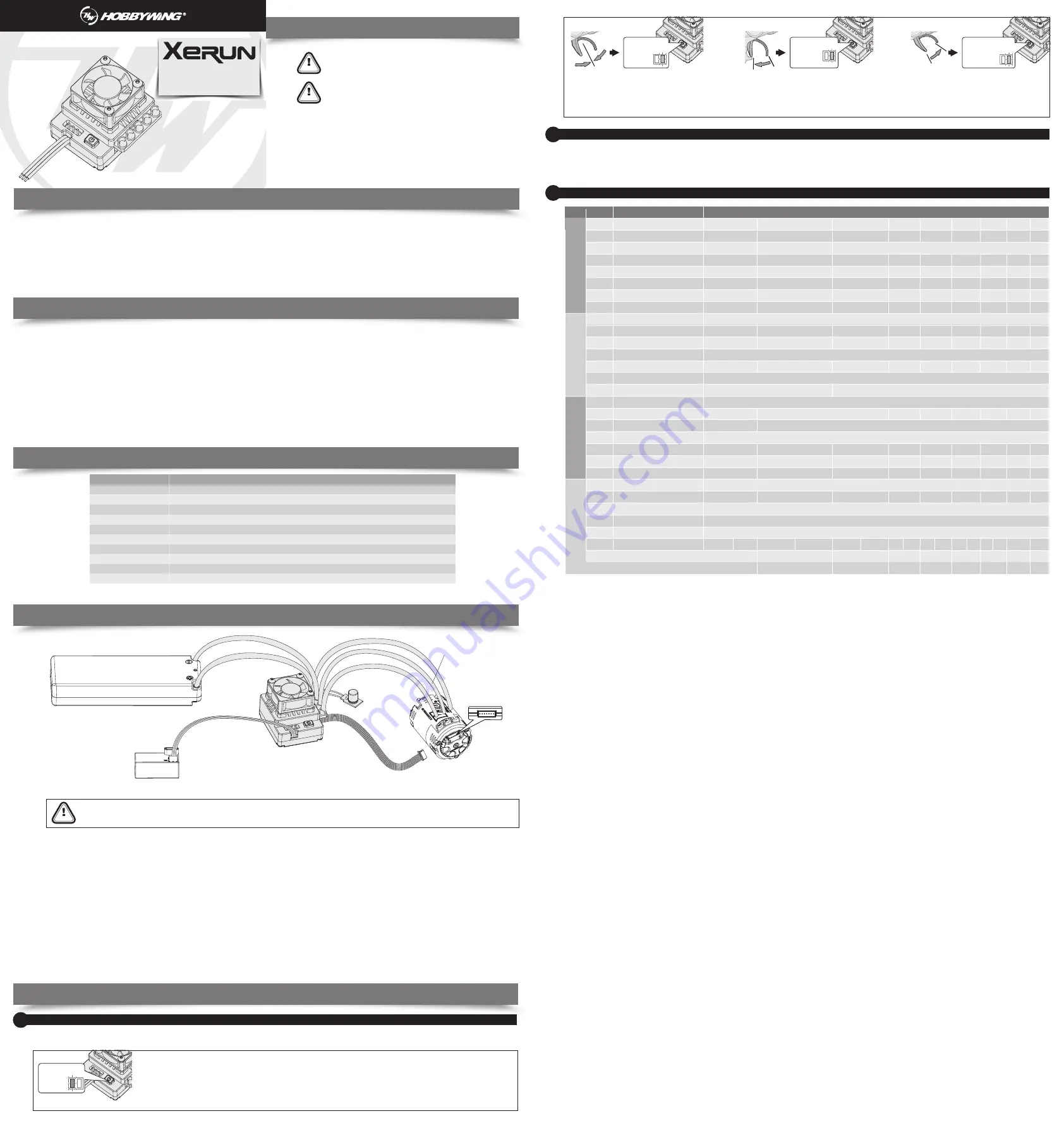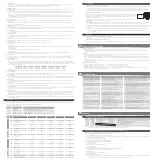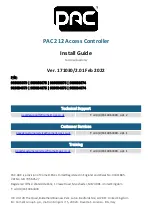
Item
1A
1B
1C
1D
1E
1F
1G
1H
2A
2B
2C
2D
2E
2F
2G
3A
3B
3C
3D
3E
3F
3G
4A
4B
4C
4D
5A
5B
5C
5D
Programmable Items
Running Mode
Max. Reverse Force
Cutoff Voltage
ESC Thermal Protection
Motor Thermal Protection
BEC Voltage
Remote Off
Sensor Mode
Throttle Rate Control
Throttle Curve
Neutral Range
Coast
PWM Drive Frequency
Softening Value
Softening Range
Drag Brake
Max. Brake Force
Initial Brake Force
Brake Rate Control
Brake Curve
Brake Frequency
Brake Control
Boost Timing
Boost Timing Activation
Boost Start RPM
Boost End RPM
Turbo Timing
Turbo Delay (sec)
Turbo Increase Rate (degree/0.1sec)
Turbo Decrease Rate (degree/0.1sec)
1-30 Adjustable (Step: 1)
0%-20% Adjustable (Step: 1%)
0-30° Adjustable (Step: 1°)
0%-100% Adjustable (Step: 1%)
1-20 Adjustable (Step: 1)
0-64° Adjustable (Step: 1°)
0%-50% Adjustable (Step: 1%)
3.0-11.1V Adjustable (Step:0.1V)
100%
8K
4K
37.5%
0%
10%
50%
62.5%
75%
87.5%
100%
12K
16K
8%
4K
25%
2K
Hybrid
Parameter Values
Forward with Brake
25%
Disabled
105
℃
/221
℉
105
℃
/221
℉
6.0V
Enabled
Full Sensored
Linear
4%
1K
0%
=Drag Brake
Linear
0.5K
Linear
RPM
6
6
Instant 0.05
Forward/ Reverse with Brake
50%
Auto
125
℃
/257
℉
125
℃
/257
℉
7.4V
Disabled
Customized
6%
2K
12.5%
Customized
1K
Traditional
Auto
Forward and Reverse
75%
Disabled
Disabled
12
12
18
18
24
24
30
30
Instant
Instant
0.1 0.15
0.2 0.25
0.3 0.35
0.4 0.45
0.5
0.6
0.7
0.8
0.9
1.0
500-35000 RPM Adjustable (Step: 500RPM)
3000-60000 RPM Adjustable (Step: 500RPM)
0-64° Adjustable (Step: 1°)
Section
General Setting
Throttle Control
Brake Control
T
iming
24K
32K
20%-75% Adjustable, Step: 5%
8K
16K
Battery
Electronic Speed Controller
Receiver
Motor
Orange (C)
Blue (A)
Sensor port of motor
Sensor wire
Yellow (B)
Release the
ON/OFF button
once the LED
flashes.
03
Features
02
Warnings
04
Specifications
05
Connections
ATTENTION
This is an extremely powerful brushless motor system. For your safety and the safety of those around you, we strongly recommend removing the pinion gear attached to
the motor before performing calibration and programming functions with this system. It is also advisable to keep the wheels in the air when you turn on the ESC.
Cont. / Peak Current
Motor Type
Applications
Motor Limit (*Note 1)
LiPo / NiMH Cells
BEC Output
Cooling Fan
Connectors
Size/Weight
Programming Port
80A / 380A
Sensored / Sensorless Brushless Motors
Stock Class of 1/10th Touring Car and Buggy Racing
Brushless Motor Limit with 2S LiPo/6S NiMH: (Touring Car) T
≥
10.5T, (Buggy) T
≥
13.5T
2S LiPo / 6S NiMH (Only)
6V/7.4V Switchable, Continuous Current of 3A (Switch-mode)
Powered by the stable BEC voltage of 6V/7.4V
Input End: No Connectors; Output End: No Connectors
31.5 x 25.6 x16.1mm (w/o fan) / 54.5g (w/ wires)
PRG/FAN Port (*powered by the built-in BEC)
Model
XERUN XR10 STOCK SPEC
•5select-to-useprofilesincludingzero-timing/blinkymode,stockmodeparticularlyapplicabletotheStockclassof1/10thtouringcarandbuggyracing.
•Innovativedouble-switchdesign(abuilt-inelectronicswitch&anexternaldetachableswitch),theexternalswitchisreallyhandywhenthecarshellisinstalledonandtheinternalswitch
is no longer touchable.
•Built-inswitchmodeBECwithamaximumoutputof6Aandvoltageadjustablebetween6Vand7.4Vforusagewithhighvoltageservos.
•Smallsizemakestheinstallationconvenient,lightweightof28g(w/owires)providesmoreweightmarginwhenadjustingthebalanceofthechassis.
•SeparatePRG/FANportisabletopoweranexternalfanformaximizecoolingperformanceorconnectaLCDprogramboxorWiFimoduletotheESC.
•WiththeNewWIFIexpressmodulefromHobbywing,usersareabletoprogramparameters,upgradefirmwareandcheckrelevantdataduringtheeventusingeithertheiPhoneor
Android devices.
•Newbrakesandthrottlefunctions:100levelsofbragbrake,50levelsofinitialbrakeforce,9levelsofmaximumbrakeforce,20levelsofbrakerate,and30levelsofthrottlerate.
•Adjustablebrakemode,PWMandbrakefrequenciesfordifferentcompetitionsandcontrolfeel.
•AdjustableTurboTiming&BoostTimingfordifferentapplications.
•Softeningfunction(HOBBYWING-initiated)formilderorwilderdrivingcontrolandbetterdrivingefficiency.
•Multipleprotections:low-voltagecutoffprotection,ESCandmotorthermalprotection,andfailsafe(throttlesignallossprotection).
•DataloggingforrecordingthemaximumESC/motortemperature,motorspeed/RPM,andothersinrealtime.
•FirmwareupgradeviaHobbywingmultifunctionLCDprogramboxorWiFiExpress(itemsoldseparately).
•Toavoidshortcircuits,ensurethatallwiresandconnectionsmustbewellinsulatedbeforeconnectingtheESCtorelateddevices.
•Ensurealldevicesarewellconnectedtopreventpoorconnectionsandavoiddamagetoyourelectronicdevices.
•Readthroughthemanualsofallpowerdevicesandchassisandensurethepowerconfigurationisrationalbeforeusingthisunit.
•Pleaseuseasolderingironwiththepowerofatleast50Wtosolderallinput/outputwiresandconnectors.
•Donotholdthevehicleintheairandrevituptofullthrottle,asrubbertirescan“expand”toextremesizeorevencracktocauseseriousinjury.
•StopimmediateusageoncethecasingoftheESCexceeds90
℃
/194
℉
asthismaycausedamagetoboththeESCandmotor.Hobbywingrecommendssettingthe“ESCThermal
Protection”to105
℃
/221
℉
(this refers to the internal temperature of the ESC).
•UsersmustalwaysdisconnectthebatteriesafteruseasthecurrentontheESCisconsumingcontinuouslyifitisconnectedtothebatteries(eveniftheESCisturnedoff).Thebatterywill
completely be discharged and may result in damage to the battery or ESC when it is connected for a long period of time. This WILL NOT be covered under warranty.
06
ESC Setup
ESC/Radio Calibration
1
Power On/Off
2
Programmable Items
3
Attention!
The temperature of its Aluminum housing may be very high when there is heavy load. For precaution, we recommend users to have a fan blown towards the ESC.
(Start with the ESC turned off), press the ON/OFF button to turn on the ESC (the indication LED comes on); and press the ON/OFF button again to turn off the ESC (the indication LED dies out).
Note 3
:
Do not turn off the ESC when the motor is spinning. The sudden stoppage may result in unwanted damage to both the motor and ESC. If there is an emergency, battery plugs can be
pulled out to switch the ESC off.
1A. Running Mode
Option 1: Forward with Brake
Racing mode. It has only forward and brake functions.
Option 2: Forward/ Reverse with Brake
Thisoptionisknowntobethe“training”modewith“Forward/ReversewithBrake”functions.Hobbywinghasadoptedthe“DOUBLE-CLICK”method,thatisyourvehicleonlybrakeson
the 1st time you push the throttle trigger forward (brake) (1st push). The motor stops when you quickly release the throttle trigger and then re-push the trigger quickly (2nd push), only
then the vehicle will reverse. The reverse function will not work if your car does not come to a complete stop. The vehicle only reverses after the motor stops. This method is for preventing
vehicle from being accidentally reversed.
Option 3: Forward and Reverse
Thismodeisoftenusedbyspecialvehicles(rockcrawler).Itadoptsthe“SINGLE-CLICK”method.Thevehiclewillreverseimmediatelywhenyoupushthethrottletriggerforward(brake).
1B. Max. Reverse Force
The reverse force of the value will determine its speed. For the safety of your vehicle, we recommend using a low amount.
1C. Cutoff Voltage
Sets the voltage at which the ESC lowers or removes power to the motor in order to either keep the battery at a safe minimum voltage (for LiPo batteries). The ESC monitors the battery
voltage all the time, it will immediately reduce the power to 30% (in 3 seconds) and cut off the output 10 seconds later when the voltage goes below the cutoff threshold. The RED LED
will flash a short, single flash that repeats (
☆
,
☆
,
☆
)toindicatethelow-voltagecutoffprotectionisactivated.Pleasesetthe“CutoffVoltage”to“Disabled”orcustomizethisitemifyou
are using NiMH batteries.
Option 1: Disabled
The ESC does not cut the power off due to low voltage. We do not recommend using this option when you use any LiPo battery as you will irreversibly damage the product. You need to
select this option when you are using a NiMH pack.
Option 2: Auto
TheESCcalculatesthecorrespondingcutoffvoltageasperthenumberofLiPocellsitdetectsandthe“3.3V/cell”rule.Forexample,iftheESCdetectsa2S,thecutoffvoltageforthe
battery shall be 6.6V.
Option 3: Customized
The customized cutoff threshold is a voltage for the whole battery pack (adjustable from 3.0V to 8.0V). Please calculate the value as per the number of LiPo cells you are using.
For example, when you use a 2S and you want the cutoff voltage for each cell is 2.8V, you will need to set this item to 5.6V.
1D. ESC Thermal Protection
The output from the ESC will be cut off with the value you have preset.
The GREEN LED flashes (
☆
,
☆
,
☆
) when the ESC temperature reaches to the preset value. The output will not resume until the ESC temperature gets down.
Warning! Please do not disable this function unless you’re in a competition. Otherwise the high temperature may damage your ESC and even your motor.
1E. Motor Thermal Protection
The GREEN LED flashes (
☆☆
,
☆☆
,
☆☆
) when the motor temperature reaches to the preset value. The output will not resume until the motor temperature gets down.
Warning!
Please do not disable this function unless you’re in a competition. Otherwise the high temperature may damage your motor and even your ESC. For non-Hobbywing motor,
the ESC may get this protection activated too early/late because of the different temperature sensor inside the motor. In this case, please disable this function and monitor the motor
temperature manually.
1F. BEC Voltage
Option 1: 6.0V
It’sapplicabletoordinaryservos.Donotusethisoptionwithhighvoltageservos;otherwiseyourservosmaynotfunctionnormallyduetoinsufficientvoltage.
Option 2: 7.4V
It’s applicable to high voltage servos. Do not use this option with ordinary servos; otherwise your servos may be burnt due to high voltage.
1G. Remote Off
Option 1: Enabled
Userscansimplypushandholdthebraketriggerfor6seconds.ThisoptionallowstheusertoturnofftheESCwithoutpushingtheON/OFFbuttonswitch.
Option 2: Disabled
UsersmustturnofftheESCbypressingtheON/OFFswitchbuttonfromtheESC.
1H. Sensor Mode
Full Sensored
Thepowersystemwillworkinthe“sensored”modeatalltimes.Theefficiencyanddrivabilityofthismodeisatthehighest.
2A. Throttle Rate Control
This item is used to control the throttle response. It can be adjustable from 1 to 30 (step: 1), the lower the throttle rate, the more the limit will be on the throttle response. A suitable rate
canhelpdrivertocontrolhisvehicleproperlyduringthestarting-upprocess.Generally,youcansetittoahighvaluetohaveaquickthrottleresponseifyouareproficientatthrottlecontrol.
2B. Throttle Curve
The throttle curve parameter reconciles the position of the throttle trigger (in throttle zone) and the actual ESC throttle output. It is linear by default and we can change it to non-linear via
adjusting the throttle curve. For example, if adjust it to +EXP, the throttle output at the early stage will be higher (than the output when the curve is linear); if it is adjusted to –EXP,
the throttle output at the early stage will be lower (than the output when the curve is linear).
2C. Neutral Range
Asnotalltransmittershavethesamestabilityat“neutralposition”,pleaseadjustthisparameterasperyourpreference.Youcanadjusttoabiggervaluewhenthishappens.
2D. Coast
The RPM of the motor will be lowered gradually when throttle is reduced. The vehicle will not reduce speed abruptly when the throttle is reduced to return to the neutral position.
Thebiggerthevalue,themorethe“COAST”willbefelt.Example,COASTof0deactivates,andaCOASTof20%wouldbethemaximumamountofCOAST.
1
.
Turn on the transmitter, ensure all parameters (D/R, Curve, ATL) on the throttle channel are at default (100%). For transmitter without LCD,
pleaseturntheknobtothemaximum,andthethrottle“TRIM”to0.Pleasealsoturnthecorrespondingknobtotheneutralposition.
ForFutabaTMtransmitter,thedirectionofthrottlechannelshallbesetto“REV”,whileotherradiosystemsshallbesetto“NOR”.Pleaseensure
the“ABS/brakingfunction”ofyourtransmittermustbeDISABLED.
2.StartbyturningonthetransmitterwiththeESCturnedoffbutconnectedtoabattery.Holdingthe“ON/OFF”button,theREDLEDontheESC
starts to flash (Note 2: the motor beeps at the same time), and then release the ON/OFF button immediately.
Note 2:
Beeps from the motor may be low sometimes, and you can check the LED status instead.
Press the ON/OFF button.
The Green LED flashes
three times and motor
emits“Beep-Beep-
Beep”tone.
Press the ON/OFF button.
The Green LED flashes
twice andmotor
emits“Beep-
Beep”tone.
3. Set the neutral point, the full throttle endpoint and the full brake endpoint.
•Leavetransmitterattheneutralposition,pressthe“ON/OFF”button,theREDLEDdiesoutandtheGREENLEDflashes1timeandthemotorbeeps1timetoaccepttheneutralposition.
•Pullthethrottletriggertothefullthrottleposition,pressthe“ON/OFF”button,theGREENLEDblinks2timesandthemotorbeeps2timestoacceptthefullthrottleendpoint.
•Pushthethrottletriggertothefullbrakeposition,pressthe“ON/OFF”button,theGREENLEDblinks3timesandthemotorbeeps3timestoacceptthefullbrakeendpoint.
4. The motor can be started 3 seconds after the ESC/Radio calibration is complete.
Move the throttle trigger
to the neutral position
Move the throttle trigger to the
end position of forward
Move the throttle trigger to the
end position of backward
Press the ON/OFF button.
The Green LED flashes
once and
motor emits
“Beep”tone.
BeginusingyourESCbycalibratingwithyourtransmitter.WestronglyrecommendHobbywinguserstousethe“FailSafe”functionontheradiosystemandset(F/S)to“OutputOFF”or
“NeutralPosition”.ExampleofcalibratingNeutralrangeandEndpoint.(*Theoperationissamewhenyou'reusingtheexternalswitch.)
01
Introduction
CAUTIONS
Congratulations and thank you for your trust in Hobbywing product. By
purchasingtheXERUNXR10STOCKSPEC,youhavechosenahigh
performance sensored brushless electronic speed controller! This speed
controller is equipped with high-tech features to enhance your
experience with Hobbywing brushless power systems. Improper usage
andunauthorizedmodificationtoourproductisextremelydangerous
and may damage the product and related devices. Please take your time
and read the following instructions carefully before you start using your
speed control. We have the right to modify our product design,
appearance,featuresandusagerequirementswithoutnotification.
We, HOBBYWING, are only responsible for our product cost and nothing
else as result of using our product.
ATTENTION
USER MANUAL
XERUN XR10 STOCK SPEC
Brushless Electronic Speed Controller
Note 1:
The recommended T counts are only applicable with the standard 3650/540 size (3 slot 2 pole) motors when ESCs are in blinky mode.
1. Motor Wiring
The motor wiring is different between the sensored and the sensorless; please only follow the introductions below.
•
Sensored Motor Wiring
There is strict wiring order from the ESC to the motor, the three A/B/C ESC wires must connect to the three A/B/C motor wires correspondingly. Next, connect the ESC sensor port and
the motor sensor port with the stock 6-pin sensor cable. If you don’t plug the sensor cable in, your ESC will still work in sensorless mode even if you’re using a sensored motor.
•
Sensorless Motor Wiring
UsersdonotneedtobeworriedinregardstotheconnectivitywiththeA/B/C(ESCandmotor)asthereisnopolarity.Youmayfinditnecessarytoswaptwowiresifthemotorrunsin
reverse.
2. Receiver Wiring
The throttle control cable on the ESC has to be plugged into the throttle (TH) channel on the receiver. The throttle control cable has an output voltage of 6V/7.4V to the receiver and
steering servo, hence, no separate battery can be connected to the receiver. Otherwise, your ESC may be damaged.
3. External switch Connecting (Optional):
A detachable switch (stock accessory) is included in the product box. You only need to plug this switch into the 3-pin port marked with "SW" when you want to use external switch
(instead of the built-in electronic switch).
3. Battery Wiring
Proper polarity is essential. Please ensure positive (+) connects to positive (+), and negative (-) connects to negative (-) when plugging in the battery! When reverse polarity is applied to
the ESC from the battery, it WILL damage the ESC. This WILL NOT be covered under warranty!
Note 4:
Item4C(BoostStartRPM)&item4D(BoostEndRPM)arenotprogrammableifitem4B(TimingActivation)issetto“Auto”.
20180518




















